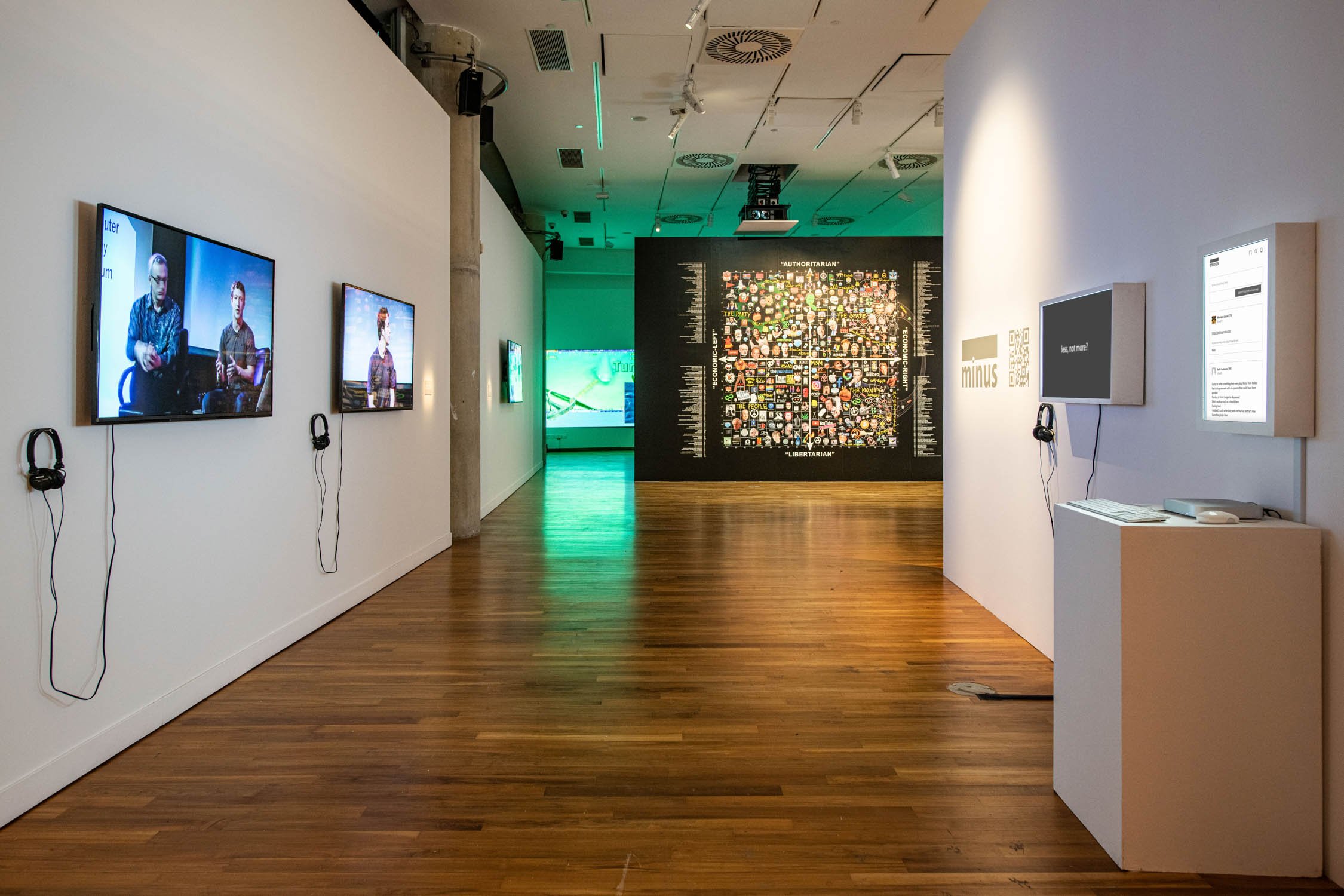May 11, 2022
Curatorial Essay: Art and the Internet
By Kristine Tan
‘Information Wants To Be Free?: Art and the Internet’, 2022, installation view. Image courtesy of Quek Jia Liang (ADM Gallery).
‘Information Wants To Be Free?: Art and the Internet‘ draws on the development of digital technology and networks to consider and critique the online information economy that governs our daily life. ‘Information wants to be free’ was an aphorism made by Stewart Brand, editor of the Whole Earth Catalog, at a hackers conference in 19841 when he referred to how the emergence of digital technology-enabled information to disseminate easily and escape proprietary barriers. Soon after in 1989, computer scientist Tim Berners-Lee’s invention of the World Wide Web advanced the desire to create free open access to information, encapsulating the idealism at the heart of digital free culture.
33 years on, we have another perspective on what it means for information to be free. While giving away services which appear to be without cost, technology companies spy on users, collecting data about who they are and what they do online. Much of this extracted data is traded in a new marketplace as prediction products and sold into a behavioural futures market that generates enormous wealth for corporations. This commodification of personal data captured by companies tracking online users is described by social psychologist Shoshana Zuboff as “surveillance capitalism” or the “claiming of private human experience as free raw material for translation into behavioural data”.2
This affects not just consumer decisions, but also the spheres of politics, society and culture. Google and Facebook have built behavioural modification empires that fuel dangerous problems such as disinformation, hate speech, filter bubbles and political manipulation, keeping users online to service their platforms, and ultimately impede users’ autonomy and agency. Recently, leaks, whistle-blowers and legal disputes have shed new light on how major internet companies prioritise infinite growth over public safety.
As the internet is increasingly privatised by monopolistic technology companies which make important decisions regarding online information transactions, extreme wealth and power is concentrated amongst those with the biggest computational power to exploit data without paying users’ for their fair market value. Former Greek Minister of Finance Yanis Varoufakis has termed this new economic paradigm “techno-feudalism”, where value extraction has increasingly shifted away from markets and onto digital platforms, driving wealth inequalities.3 It is within this context that the works in this exhibition reveal insights about our information civilisation.
“From early ideas of a free global exchange of information to a network that can no longer claim to be democratic or neutral, the international and multigenerational group of artists in this exhibition raise critical questions about the commercial exploitation of our personal information and our compromised autonomy as a result of Big Tech. ”
The exhibition opens with Michael Mandiberg’s ‘Print Wikipedia’ installation, a striking visualisation of the decentralised knowledge sharing project Wikipedia. The American artist wrote software that transformed Wikipedia’s entire English database into printable volumes which have been presented in various iterations since 2015. ‘Print Wikipedia’ is both a utilitarian visualisation of the greatest accumulation of decentralised human knowledge and a poetic gesture toward the challenges of knowing in the age of big data. Wikipedia’s stringent informational requirements and discarding of bad information is antithetical to other social web where misinformation, sensationalism and clickbait take precedence.
Michael Mandiberg, ‘Print Wikipedia’, 2009-2022, printed books, wallpaper and shelves. Image courtesy of Quek Jia Liang (ADM Gallery).
The works of Singaporean artists Kara Chin and Bani Haykal reflect on our difficulties in accurately understanding our current technological climate and the intentionally obtuse black box design of the algorithms that navigate our daily life. Kara Chin brings these unseen forces to life in her animations ‘Before Alter, ‘Followers’, ‘Fitbit Worship’ and ‘Alexa Seance’. In her videos, Chin explores technology as a contemporary form of magic, observing our spiritual devotion towards devices that have been assimilated into our everyday environments. The fetishistic belief in technology’s efficacy to change the world runs parallel to the surveillance of the modern individual. From wearable technology that tracks intimate activities like sex lives to voice assistants eavesdropping in homes – people fail to realise that magic is in fact, a form of deception.


